|
|
|
Sort Order |
|
|
|
Items / Page
|
|
|
|
|
|
|
| Srl | Item |
| 1 |
ID:
145738
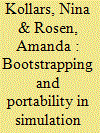

|
|
|
|
|
| Summary/Abstract |
Despite the existence of a large literature on the use and effectiveness of simulations as part of the active learning pedagogical toolbox, simulations have yet to achieve wide adoption rates among college instructors. One of the principal constraints is time: traditionally, most simulations require extensive time for the faculty to design, prepare, and use in the classroom setting. This article examines two design features of simulations aimed at solving this problem—portability, where simulations are designed as a framework that can be used for different subjects, classes, and disciplines; and bootstrapping, or the tying of the simulation content to commonly known fictional or pop-culture scenarios. Combined, these two features can reduce some of the barriers to simulation use in the classroom. We conclude by illustrating both principles with a sample simulation called “The Trial of Goldilocks.”
|
|
|
|
|
|
|
|
|
|
|
|
|
|
|
|
| 2 |
ID:
145735
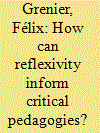

|
|
|
|
|
| Summary/Abstract |
The constitutive effects of teaching activities on the study of international relations (IR) and on the practice of international relations have generated a long-term interest in approaches to teaching and learning in IR. Recently, a cluster of literature has emerged that focuses on critical pedagogy in IR, which questions traditional relations of power, ideas, and norms in the classroom. However, these inquiries have yet to be systematically connected with reflexivity in IR (i.e., the developing awareness of the diversity, production, and positionality of knowledge). This article proposes that critical pedagogies and reflexivity are mutually reinforcing. It argues that applying reflexivity to teaching activities in IR raises awareness about the social conditions enabling the (re)production of specific understandings of the world. To support this proposition, the article presents and evaluates a trial IR seminar inspired by reflexivity. In this trial seminar, three aspects of reflexivity were developed (i.e., theoretical, sociological, and self-reflexivity), each of which supports critical pedagogy. This article explains how these three perspectives were infused into different trial seminar activities, to varying degrees of success. It also evaluates how the development of the reflexive agenda can be of particular benefit to IR scholars, IR students, and critical pedagogy as a whole.
|
|
|
|
|
|
|
|
|
|
|
|
|
|
|
|
| 3 |
ID:
145733
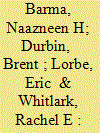

|
|
|
|
|
| Summary/Abstract |
A crucial dimension of bridging the gap between international affairs scholarship and policymaking is the generation of substantive, policy-relevant research programs. We describe the use of scenario analysis as a valuable experiential and problem-based technique for developing innovative research ideas in political science. We focus especially on the scholarly and pedagogical potential of scenarios for doctoral students by describing the structured use of scenarios at the annual New Era Foreign Policy Conference. The features of scenario analysis that commend its use to policymakers also make it well suited to helping political scientists generate policy-relevant research programs. Scenarios are plausible and textured stories that help imagine how the future political-economic world could be different from the past in a manner that highlights policy challenges. Scenario analysis can throw into sharp relief overlooked, yet pressing questions in international affairs that demand focused investigation. In turn, the search for answers can shape important research programs geared toward providing actionable clarity in understanding contemporary global issues and challenges.
|
|
|
|
|
|
|
|
|
|
|
|
|
|
|
|
| 4 |
ID:
145739
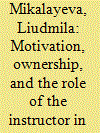

|
|
|
|
|
| Summary/Abstract |
This article systematizes recently published accounts and the author’s experience on motivation, learning process ownership, and the role of the instructor in active learning methods, such as role-plays. It argues that active learning is most productive when the instructor creates and consistently enforces a stable and clear framework of rules. Active learning methods often produce higher levels of motivation, thanks to a greater visibility of students’ efforts, higher stakes of success within a competitive collaborative setup, and a greater ownership of the whole process by students. High levels of motivation arguably improve the quality and depth of learning. Novice users of active learning may, therefore, perceive that the self-effacement of the instructor in a fully horizontal cooperative setting is the right way to optimize learning outcomes. However, ownership and increased motivation are likely to create several problems—overmotivation, confusion, alienation, and hostility—that can be solved best by the instructor. This article uses a conceptualization of the student–instructor relationship in which cooperation and dominance are not mutually exclusive and claims that instead of self-effacement, a cooperative, but authoritative, relationship between students and instructor maximizes the learning potential in active learning settings..
|
|
|
|
|
|
|
|
|
|
|
|
|
|
|
|
| 5 |
ID:
145737
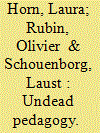

|
|
|
|
|
| Summary/Abstract |
A global zombie outbreak constitutes a hypothetical event in world politics that could likely lead to the collapse of civilization. At the same time, the very threat of such a global catastrophe offers a unique experimental terrain on which to investigate various possible changes and developments in human interaction in social, economic, and political processes. In this article, we discuss our experience with using a global zombie outbreak-based simulation in International Relations teaching and our attempt at measuring the learning outcomes, taking our point of departure in the existing literature on active learning. Following an outline of the objectives, setup, and parameters of the simulation, we evaluate the results of the survey we conducted of the student participants and discuss the learning outcomes discerned.
|
|
|
|
|
|
|
|
|
|
|
|
|
|
|
|
| 6 |
ID:
145736


|
|
|
|
|
| Summary/Abstract |
This article explores how students experience fictional television as part of their broader learning experience. In particular, the article investigates the potential role of fictional television in the development of visual literacy and critical evaluative skills. The article reports the findings of an experiment into critical evaluative viewing, which measures the foreign policy beliefs of students after exposure to two contrasting episodes of NBC's The West Wing. The results indicate that students are influenced by fictional television, but in perhaps unexpected ways. Although nuanced, the findings suggest that students demonstrate and develop critical evaluative skills—and visual literacy—in two different ways. First, students oppose the fictional/political message to which they are exposed. And, second, students reject the options that are presented to them in their totality. The article concludes with a discussion of the implications of these findings for teaching critical evaluative skills and visual literacy.
|
|
|
|
|
|
|
|
|
|
|
|
|
|
|
|
| 7 |
ID:
145734


|
|
|
|
|
| Summary/Abstract |
As is commonly the case with interdisciplinary programs, International Studies (IS) programs often have an “identity crisis,” particularly in institutions dominated by traditional academic departments. At the same time, these programs continue to flourish; in some cases, IS programs service as many or more students than many traditional departments. The rapid growth of these programs, and the vast diversity of ways in which they are administered, raises the question of what specific factors contribute to program success. Utilizing a comprehensive database of all IS programs across the country, we survey program directors to uncover some of the key factors and practices that contribute to program success. In addition to providing systematic insights into IS as a field of study, we also contribute to a better understanding of how interdisciplinary programs can flourish within their home institutions, and provide some guidance for ascertaining “best practices” in our field of study.
|
|
|
|
|
|
|
|
|
|
|
|
|
|
|
|
|
|
|
|
|